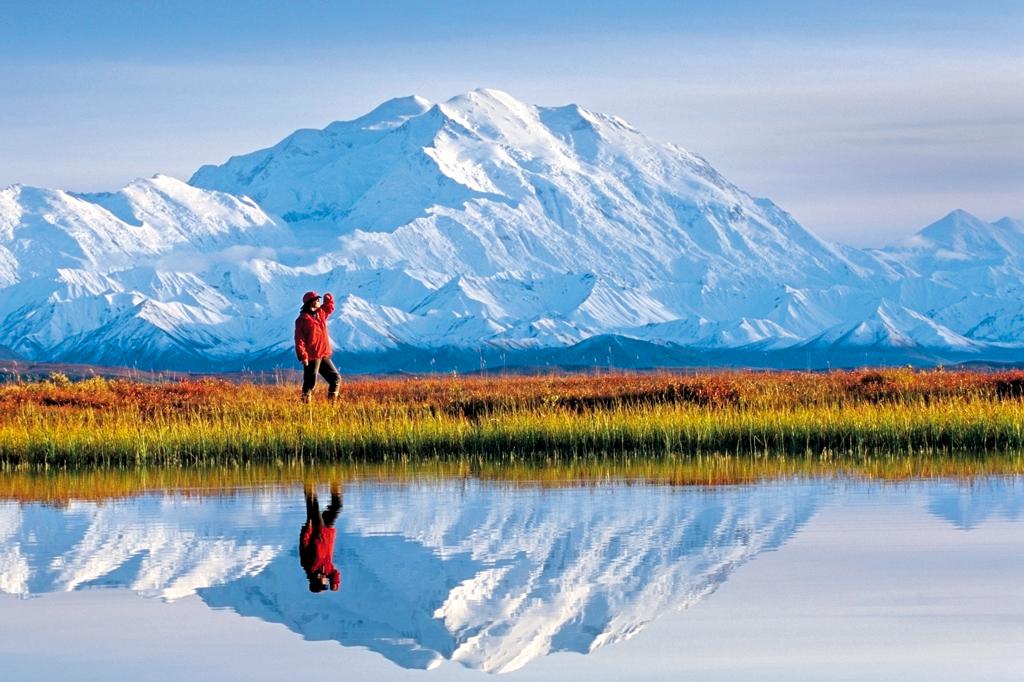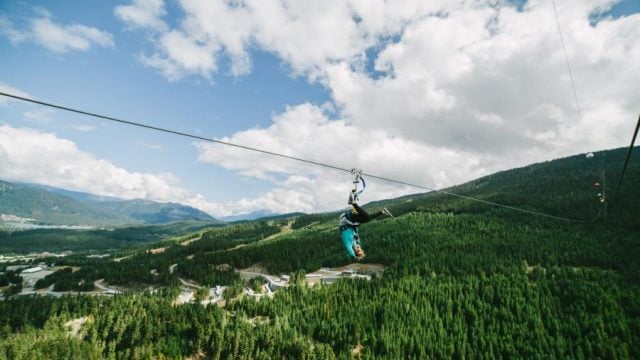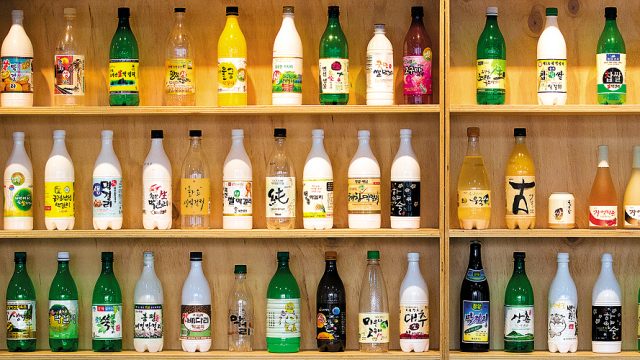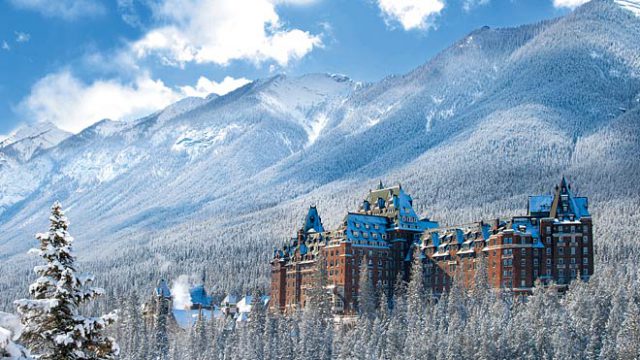Denali
It is hot in Alaska and I am not afraid of sounding foolish saying so,

Denali National Park is spread over six million acres and includes lowland forests of poplar, aspen and paper birch; the tundra with small plants and lichens; and the Alaska mountain ranges. At 20,320ft, Mount McKinley is the pride of Denali. It is the highest point in North America and seems to float, rising sheer above the surrounding mountains. The Athabascan tribe of Alaska called it ‘Denali’ or the High One. Though the park carries the original name, political consideration sensured that Denali became Mount McKinley, after William McKinley, US presidential candidate in 1896 and president the following year.

The next day I take the shuttle into the park. It is still only the start of the tourist season and there are large patches of snow on the ground, but the dry scrub terrain is prone to fires and there are warning signs everywhere, ‘Fire Danger: Very High’, ‘Fire Permit Required’. I am part of the first batch of tourists to the park and visibility is good (read very warm, sunny day). We are lucky enough to see the big four—moose, caribou, Dall sheep, grizzly bears (mother and cub)—and a fox still in its winter coat, as a bonus. Very soon three more buses arrive, packed with tourists, necks craned, camera and binoculars at the ready.

Every year, Denali gets an estimated 400,000 visitors. In peak season, it has been likened to London’s Oxford Street in July, and even now, on my return to Denali village I count 20 coaches parked outside hotels and near the marketplace. There are perhaps two dozen shops selling souvenirs, snacks, ice cream and cold drinks. I buy a hat to shield my head from the sun. Unsurprisingly, there is an Indian restaurant, Bombay Deluxe, and at one end of the market a slightly crooked signpost that lists distances to some major capitals of the world. Of these the furthest is New Delhi: 5,708 miles.
Juneau
The capital of Alaska is unique in that it can be accessed only by boat or plane. Small seaplanes line Auke Bay, rippling blue and gold in the bright sunshine. Juneau is the seat of government, but from May to September is overrun by tourists. Its main street, Egan Drive, goes on for about 42 miles and then comes to a dead end. Every year, nine million cruise ship passengers visit Juneau. It is perhaps the best place to view humpback whales (some tour operators offer to refund money if none are sighted), orcas, sea lions, etc.

Our excursion is successful and, apart from whales, we are lucky enough to see a pod of frolicking orcas about 50 feet away. Three smaller boats are barely a few feet away from the orcas. Regulations dictate a mandatory 100 feet distance, but the final decision is left to the wildlife. I feel aggrieved because all my photographs have more boat than orca.

The other attraction in Juneau is the Mendenhall Glacier, often described as the ‘drive-in glacier’. It is so accessible that it gives the remote, pristine image of glaciers a bad name. It is nonetheless stunningly beautiful with its 1.5-mile face, forests, streams, mini lakes, ice and ice floes glinting blue in the strong sun (I am now beyond surprise). Locals, in shorts, are out in strength, sunbathing, while children paddle in the small pools. I am hot, thirsty and desperate for shade and in urgent need to get rid of my ‘inners’.

Most cruise ships dock in three Alaskan towns—Ketchikan, Juneau and Skagway—and in all three, the biggest, glitziest shops lining the harbour are jewellery shops. Apparently, there is something about a cruise that unlocks the human shopping gene. Visitors buy not only the ‘Northern lights’, a topaz with green, maroon and reddish hues (guilty), but also expensive diamonds and other precious gemstones. Tanzanite seemed to be the new stone on the block: a blue ‘rare’ stone from Tanzania. I meet a young Indian, Mukund Bathija, in his large jewellery shop. He shifted to Juneau from Mumbai 10 years ago, and is one of nine Indian families settled here. Business is flourishing. I have no hesitation believing him; last year the revenue from jewellery sales was in the range of $25 million. Cruise trips seem to bring out, in equal measure, the romantic impulse as well as a willing suspension of thrift and common sense.

In 1867, secretary of state William Seward signed a treaty to purchase Alaska from Russia, for $ 7.2 million—less than 2 cents an acre. This vast wilderness saw prosperity with whaling, salmon runs and canning, but it came into the limelight in the late 19th century during the gold rush to the Yukon Mountains. Stories abound about the hardships endured by the prospectors as they made their way up into the mountains. Only about40 per cent made it, and of these only a minuscule number became rich on gold. One of the would-be prospectors gave up halfway and started repairing the shoes of those continuing their climb. He charged five dollars per shoe; today he is known as the man who started the successful chain of stores, Nordstrom.
Anchorage
The largest city in Alaska has attracted settlers from places distant and diverse. Those I spoke to said they had come here for its laidback life and that, despite the long sunless winter, they enjoyed the warmth of greater social interaction. The Trans-Alaskan Pipeline runs 300 miles from the city, and has contributed to the financial welfare of all the residents of Alaska. Every year, the US government pays roughly $1,000 (depending on the year’s profit) to each member of a family, a tradition that began when a percentage of the profits was paid to those who lost their land when the pipeline was laid, but now extends to all residents.

Three of the long-distance coaches that I travelled on were driven by women. They were drivers, helped load/unload luggage and, as part of the narrated trip, were chatty and informative: from telling us that caribou and reindeer were the same (the latter were domesticated), pointing at the house where Sarah Palin lived, to advice on how to make sense of the weather variables in Alaska. As for the last, our coach driver Anna summed it up succinctly: “There is no bad weather. There is only bad clothing!” A fact that I had been made uncomfortably aware of in the last few days!
The Information
Getting There
Alaska Cruise departures are mainly from Seattle, USA, or Vancouver, Canada. We took our seven-day cruise from Vancouver. Both Seattle and Vancouver are well connected by air to all major cities of the world.

The Cruise
Most cruise ships stop in Ketchikan, Skagway, Juneau, and Icy Strait Point; ships often cruise up to the Hubbard Glacier. Our route took us all the way to Seward since we wanted to go to Denali but seven-day cruises have various routes to choose from.
All towns where the ship drops anchor offer a number of excursions that take you out to sea in smaller vessels to watch marine life and scenery. There are coach trips from the mainland into the mountains, to see the Mendenhall Glacier or even to visit the Yukon Mountains in Canada (you’ll need a Canadian visa if visiting Yukon). Cruise prices start from $900 per person and go up depending on the cabin/stateroom/suite. Best to book in advance, especially in peak season (July/August).
What to See & Do
We disembarked at Seward and took the coach to Anchorage. The coaches are comfortable and the journey takes 4-5 hours. From there we continued to the Denali National Park which is another 4-5 hours including breaks for tea, coffee and snacks. Visitors can stop in Anchorage and check out the Anchorage Museum of History and Art, the Alaska zoo, the Alaska Aviation Heritage Museum, etc. The town is pedestrian-friendly but cabs are easily available. Alaska is a paradise for those interested in cycling, trekking, camping and even panning for gold!
When to Go
The best time to visit Alaska is between May and September. The weather can be fickle here, so keep light woollens and a warm wind cheater handy.
Denali National Park
Juneau
Anchorage





